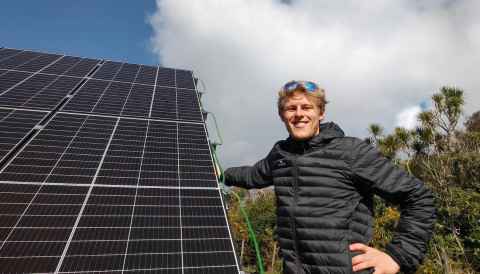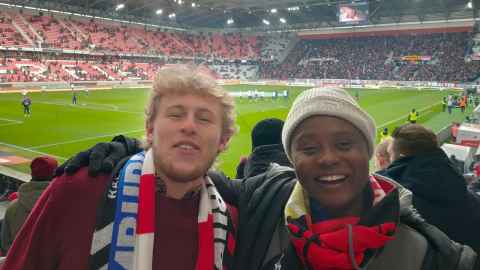Energy exchange: student’s semester in Europe’s ‘Solar City’
03 October 2024
Jack Anderson has big plans for the future of energy in Aotearoa, shaped during five unforgettable months studying solar energy in Germany.

Achieving 100 percent renewable energy for the Oceania region by 2035 might sound like a lofty goal. But it’s one we must strive to meet, says Bachelor of Engineering (Honours) student Jack Anderson. “We’re enormously lucky to have the natural resources we do. A huge percentage of Aotearoa New Zealand is suitable for wind power; we have geothermal resources and good solar exposure.”
So how do we achieve this ambitious target? We’ll need a baseload to draw from when the sun isn’t shining and the wind isn’t blowing, which could be a combination of geothermal energy and pumped storage, plus novel technologies like tidal generation, he says. He would also like to see New Zealand guide other countries towards renewables. “We are doing extremely well and can be a leader for countries like Australia and those in the Pacific Islands, which are lagging. We need to build strong relationships worldwide and help the rest of society transition.”
Jack’s interest in renewable energy was sparked as a nine-year-old when his grandparents took him to the Te Āpiti Wind Farm in Palmerston North. “I was completely blown away by the scale of the project and the fact that you could power cities through nothing but the wind,” he remembers. “I’m still getting my head around it. That stuck with me.” In high school, he was the director of the environmental club, and when it came to choosing a career path, he took a leap of faith and enrolled in an engineering degree majoring in civil in 2021. “I haven’t looked back since,” he says.
In 2023, he flew to Freiburg, Germany, for a five-month semester exchange to learn more about sustainable energy and master the German language. The trip was made possible thanks to a scholarship from the Energy Education Trust of New Zealand (EETNZ), and gave Jack the chance to explore Europe’s ‘Solar City’. Freiburg boasts more than 150,000 square metres of solar cells and is home to the world’s first zero-energy public building, the Town Hall. Located at the intersection of Germany, France and Switzerland, it’s a “beautiful, fairy tale town,” he says. “I didn’t want to go anywhere else.”
Jack studied numerical optimisation, hydrogeology and solar energy at The University of Freiburg. Founded in 1457, it is one of Europe’s oldest tertiary institutions. He had the opportunity to work with Dr Moritz Deihl, director of Zentrum Eneuerbare Energie (Centre for Renewable Energy), who invited him to the organisation’s annual Renewable Energy Day conference. He also had the chance to learn from Dr Holger Neuhaus, a top researcher at Europe's leading photovoltaic (PV) research institute, Fraunhofer ISE.

When he wasn’t studying, he spent time training for a marathon around Seepark, a popular lake next to his student village. Freiburg is a highly international city, and he befriended students from the US, Spain, Iran, Peru and even the fellow rugby-mad nation of Georgia during his time there. He shared meals with his apartment neighbours, who were also visiting from abroad, and made the most of the city’s natural backdrop, hiking in the Black Forest and riding the cable car to the Schauinslandbahn summit to see the Swiss Alps. And yes, black forest gateau was indulged in, he confirms.
To call the experience influential is an understatement. “It was a very distinct chapter of my life that almost feels like a dream,” he reflects, citing the network of people he built as a key highlight. He remains in touch with Dr Diehl and hopes to connect the University of Auckland’s energy centre with Freiburg’s. He explains that both institutions have resources the other doesn’t: for example, Freiburg is home to world-leading PV research, and Auckland’s civil engineering department is ranked in the world's top 40. In bridging the two centres, we tap into mutual learning and increase the applicability of research.
His time in Freiburg also inspired him to start his own solar design company, and in 2024, he founded Seepark Renewables with his best friend Cameron. They plan to explore seed funding and eventually implement the design and consenting processes for small-to-medium-scale solar projects in New Zealand, with a long-term goal of contributing to the 100 percent renewable energy target.
For now, though, Jack is focused on his final semester of study. He’s immensely thankful to EETNZ, who awarded him scholarships in both 2023 and 2024. As well as enabling his exchange to Germany, which led to the creation of Seepark Renewables, their support has given him the space to reduce his hours tutoring math and pour everything into his last exams. “I’m incredibly grateful to the trustees, and I intend to use what I’ve learned in my exchange to help me push New Zealand forward,” he says.
After his studies, Jack will move to Wellington to begin a full-time civil engineering role with consultancy Tonkin + Taylor. He hopes to contribute to some of the major pieces of infrastructure for New Zealand and gain valuable industry experience to grow Seepark Renewables to its full potential. Watch this space.
Media contact
Helen Borne | Communications and Marketing Manager
Alumni Relations and Development
Email: h.borne@auckland.ac.nz